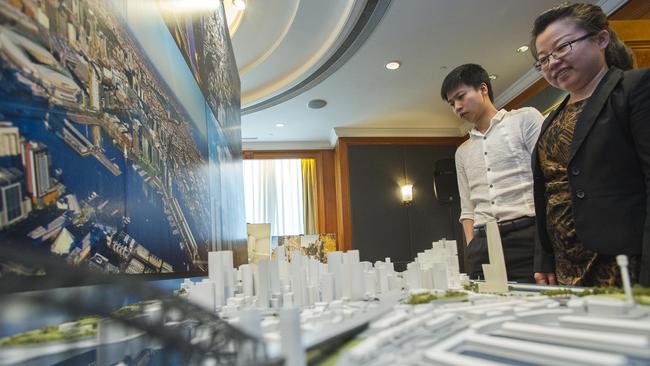Australia set to shine on Asia’s Trump aversion
There are four areas in which our economic outlook is being transformed by Asia’s aversion to Donald Trump’s presidency.

Let me draw together four areas where the Australian outlook is being transformed by the Asian reaction to Trump.
Firstly, the Chinese have returned to Australia to buy off-the-plan apartments in Sydney and Melbourne on 10 per cent deposit in the belief that, before the year is out, the Chinese government will ease its current restrictions on money leaving the country (Apartment outlook brightens as Chinese buyers come rushing back, March 10).
Secondly, overseas students from China, India, Pakistan and other parts of Asia and the region are pouring into Australia in unprecedented numbers. Enrolments for 2017 are up 20 per cent.
Thirdly, overseas demand for tourism and health services is also high. In universities, tourism and health we are in danger of not having the facilities and organisational structures to satisfy the customer demands for a good experience.
Fourthly, Asian capital is assisting in one of the great hidden stories of Australian commerce — the role being played by Australia’s vast army of unregulated lenders, the so-called shadow banking system, in curbing significant losses by Australian banks in Melbourne apartment developments.
Between now and June 30, around 15,000 apartments in Melbourne which were bought off the plan on 10 per cent deposit some years ago will be completed and due for settlement.
A large portion of the developers building the apartments were funded by Australian banks but the banks, under pressure from the regulator APRA, are refusing to fund the developers’ buyers, particularly the overseas Chinese who dominated the purchases.
In the vicinity of $7 billion to $10bn must be raised.
Investors in the unregulated or shadow banking system are being rewarded for the higher loan risks involved with interest rates of around 8 per cent. To offer funding, the shadow banks usually require that the Chinese somehow extract enough money to fund 60 or 70 per cent of the equity.
The shadow sector funds the rest. Among the lenders dabbling in the market are Asian and Middle Eastern financial institutions that are bemused at our local banking system.
Nevertheless, the odds are against such huge sums being raised in such a short time. But the strong overseas sentiment and the return of off-the-plan buying of future developments by Chinese, are signs that, over time, the situation can be managed.
But the banks suddenly see competition, so they’re are calling for clamps on the shadow system.
It is vital for the nation that, at least until as much of the Melbourne apartment rescue as possible has been undertaken, that there be no curbs on the shadow system.
Accordingly, calls in the Weekend Australianfor greater regulation of shadow sector by the Australian Bankers Association must be ignored.
When Australian banks decided to back developments in Melbourne they did not always understand that while some would be top-quality projects, others were small apartments built to minimum building standards.
Banks and bank shareholders stand to lose big sums if the shadow sector can’t raise sufficient funds and our trigger-happy banks panic and start pulling the plug on the Melbourne developers they funded.
Hopefully the re-emergence of the Chinese may convince the bankers not to panic if their developers’ customers miss out on the first round of rescue funds from the shadow sector.
I should emphasise that once the market understands that the Chinese have returned, a lot more Australian negatively geared investors will purchase apartments where the Chinese can’t or do not want to settle.
Indeed, in Sydney, it was the negatively geared apartment buyers that filled a large portion of the gap when the Chinese withdrew last year.
Harry Triguboff’s Meriton group is the largest owner and developer of apartments in Sydney and at that time was expecting that the withdrawal of the Chinese would trigger a big fall in Sydney apartment prices.
In the post-Trump era, with the Chinese back, there is now no chance of a big fall. Meriton recently increased its off-the-plan development prices by 3.5 per cent and demand was unaltered.
In the off-the-plan market, overseas Chinese are now snapping up some 50 per cent of Meriton apartments. Australian-born Chinese are taking around 25 per cent and Australian investors/first homebuyers are taking about 25 per cent.
In Melbourne, despite the 15,000 apartments coming up for settlement, Chinese are also rushing developers for off-the-plan purchases where settlements are some years away.
But Triguboff is nervous that the latest rise in Sydney real estate might go too far and could create another boom.
Any big jump in apartment prices will almost certainly flow into much higher prices for land and that might cause banks to act very aggressively on the market.
So, while Triguboff is a big winner from the latest developments, he is also apprehensive about the long-term implications of higher and higher prices ends.







Australia is now emerging as one of the greatest beneficiaries of the so-called “Anti Trump” revolution sweeping Asia and the Middle East and, as a result, if we could only get our energy policies in some semblance of order, we’re set for much better economic times. At least, that’s what the Chinese have realised.